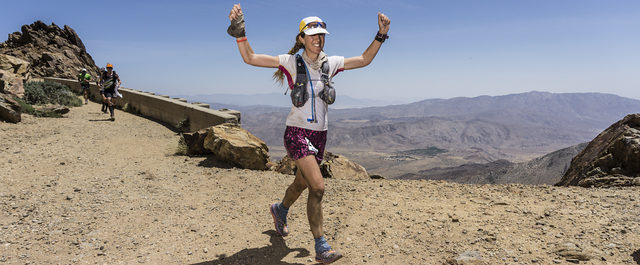I enjoy running with music – not all the time, not often while racing. But on long training runs, music reminds me of why I’m out there, of why it’s worth the effort. My playlist is eclectic, ranging from the Doors to the Avett Brothers, from the Dire Straits to Conor Oberst. You won’t find much country music on it, but you will find 57 songs by a cowboy singer named Chris LeDoux.
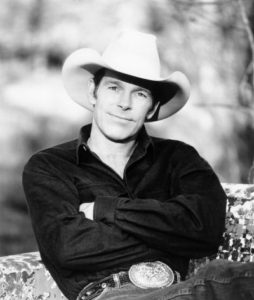
Most of my trail running, kale-eating, Subaru-driving friends have never heard of him. He was a bronc rider. He was also a singer-songwriter who lived the life he sang about. Chris LeDoux spent many years traveling from rodeo to rodeo, getting on bucking horses, getting bucked off bucking horses, sometimes winning, more often losing. He did win the world championship in bareback bronc riding in 1976. And he wrote songs about all of it.
I learned to appreciate Chris LeDoux when first started to make a living as a colt starter and horse trainer in the early 1990s. My life back then felt a lot like the rodeo circuit: hard work, tired muscles, bruises. A few blue ribbons sprinkled in between endless days of riding one horse after another until it was dark. Sometimes, riding more horses long after it was dark. Sleep deprivation. Grease-stained paper bags of fast food. Gas station coffee in giant styrofoam cups. Big dreams. Running into the same bunch of people over and over at different fairgrounds. Long roads, long hours spent on freeways, in a crew cab truck with a six-horse trailer in tow. And Chris LeDoux on the stereo, singing about horses and and gold belt buckles, about his life, which sounded like ours:
I guess I always knew it
What it is that makes my world go round
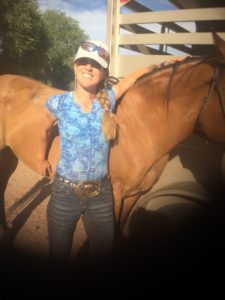
Wear your buckle to work day is every day
Twenty-five years later, I still ride horses for a living. I tried to quit a time or two, tried to settle into more conventional jobs. It never lasted because I ended up missing the horses too much.
Many things have changed. I have gotten older and keep trying to be smarter. I spend more time in saddles that don’t have horns. Shows and ribbons matter a lot less than they used to. I ride eight horses a day instead of fifteen. My food choices are, for the most part, healthier than burned coffee and a bag of Doritos. The change I’m happiest about is that I discovered ultra running, which now takes up all the time I don’t spend on horseback.
Other things have not changed at all. I still work long hours, still get weird tan lines, and I still listen to Chris LeDoux. His songs, written for the world of rodeo, make a lot of sense for ultra runners, especially those competing in 100-mile races:
“And if you’re mighty lucky, and you got a lot of try, there’s a big gold buckle waiting at the end of the line.”
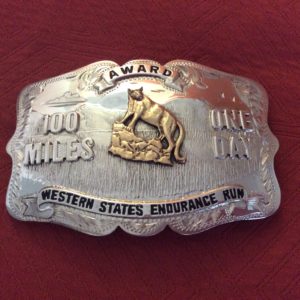
I hope my Western States buckle this June will be silver, not gold, but any buckle is better than none.
This overlap is no random coincidence. 100-mile races evolved from a 100-mile endurance ride named the Tevis Cup, which has been around since 1955. Gordon Ainsleigh made history in 1973, when his horse went lame and he decided to cover the distance on foot, checking in at the vet checks, drinking from streams and eating canned peaches along the way. A couple of friends joined him the next year, a few more the year after that, and the Western States endurance run was born. This is why silver buckles still are the reward for finishing 100 miles. Ultra runners covet belt jewelry every bit as much as cowboys do, and work just as hard to win them
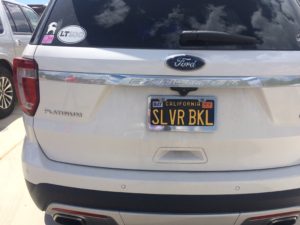
Cowboy or ultra runner? Does it matter?
Running 100s is much more like rodeo than most people think, even beyond the buckles. Like cowboys driving from rodeo to rodeo, we’re out there all night, fighting exhaustion, running on adrenaline fumes and chasing cutoffs. And like them, we do it because we love it:
“I’ve been a driving all night ‘neath the pale moonlight
Waiting for the sun to start showing
There’s too many miles and not enough time
But I’m gonna make it just the same
Well, it’s a mighty tough life but I like it alright
You know I wouldn’t have it any other way.”
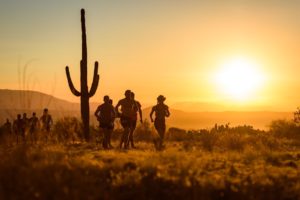
too many miles and not enough time . . .
Getting older as an ultra runner has its challenges, too. The good thing is, ultra runners don’t have to quit doing what they love. Unlike bronc riders, we can keep putting one foot in front of the other into our golden years. I’m grateful for this, but at 47, I have to face the reality of bright-eyed people in their twenties zooming past me. Some of them look surprised, like they can’t believe someone their mother’s age is competing with them out on the trail. Again, Chris LeDoux has put into words what I feel:
“As I climbed up the gate I heard that young cowboy say
Well, that old man ain’t gonna ride and I had to smile
I said son it ain’t age that makes me look this way
It ain’t the years, boy, it’s the miles.”

Ian Maddieson, age 75, still running 100s.
Like riding horses, trail running involves a lot of involuntary contact with the ground, at least for me. Biting the dust is a risk we take, though the consequences tend to be less serious for runners than for bronc riders.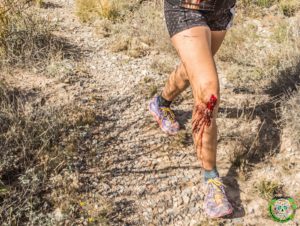
Still, when I’m curled up on the dirt, taking stock of my body parts and cursing in every language I know, sage advice from my favorite cowboy poet helps me get back out there:
“Stand up again, shake it off if you can,
Get back on that pony and ride.”
Chris LeDoux died in 2005, way too early. His music lives on, though. Sometimes, in the late, dark miles of a 100, when desert shadows come alive, when my mind plays tricks, I see a cowboy-hatted skeleton riding next to me on a black horse. He tips his hat. I wave. We talk about how short life is, about how beautiful the sunrise will be, about belt buckles we’ve won, or haven’t won but dream about winning someday. And I still think there’s a lot of wisdom in his songs:
“Yes, I’ll gladly take ten seconds in the saddle
For a lifetime of watching from the stands.”
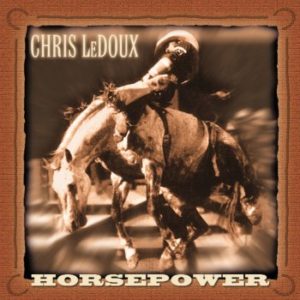
The last album. Good ride, cowboy.
All lyrics by Chris LeDoux except where otherwise noted :
“Going and Blowing”, from Songbook of the American West, 1976
“Ten Seconds in the Saddle” from Western Tunesmith, 1979
It Ain’t the Years, it’s the Miles” from Gold Buckle Dreams, 1987 1994
“Get Back on the Pony and Ride” (Cori Conors) from Under This Old Hat, 1993
“Horsepower” from Horsepower, 2003
